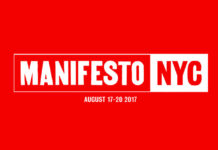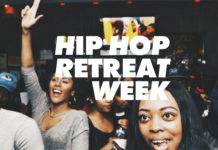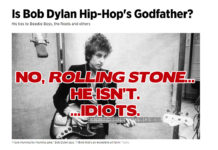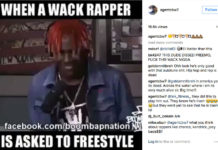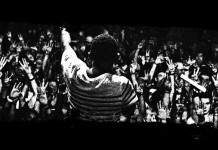Hip Hop Photographer Johnny Nunez Tells Stories
Before the recognition, before the New York Times article, before Russell Simmons personally hand-picked him to photograph his events, and before a movie was made about him, Johnny Nunez, the scrappy, hustling hip-hop photographer from Brooklyn, took a picture of two rappers.
Both were young, rising stars, toasting glasses in the air to success. Brooklyn’s Jay-Z had not quite risen to superstardom, but was well on his way. Queensbridge native Nas was enjoying the fruits of his labor in a genre where he still possessed a messiah-like reputation. It was a good time.
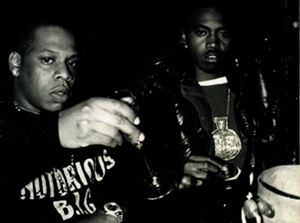 In the years since, these two men would go on to reach great heights in their respective careers, in part both despite, and because of each other. Once mutually respectful colleagues, a very personal war of rapped words eventually erupted between the two, with each artist releasing heated battle songs aimed squarely at the other, full of fiery insults and fueled by hip-hop’s collective hunger for competitive wordsmithing.
In the years since, these two men would go on to reach great heights in their respective careers, in part both despite, and because of each other. Once mutually respectful colleagues, a very personal war of rapped words eventually erupted between the two, with each artist releasing heated battle songs aimed squarely at the other, full of fiery insults and fueled by hip-hop’s collective hunger for competitive wordsmithing.
Each rapper was vying for a victory ultimately to be decided by record sales, but perhaps just as important in this world of musical braggadocio, they were battling for the symbolic title, “King of New York”, a figurative seat vacated in 1997 by the stunning murder of hip-hop heavyweight The Notorious B.I.G.
While neither Jay-Z nor Nas would dare self-proclaim themselves monarch, the hip-hop public seemed thirsty for an occupant to fill this empty mantle. The void Biggie left was too large, too painful. Rap had become too powerful, and New York held too prominent a place in hip-hop history to be without a worthy ambassador representing its birthplace. The battle for this spot was fierce, and in the end, while both lived to rap another day, neither would be able to unanimously claim the throne.
Who won or lost this epic battle is, in the context of this story, not important. In fact, the two squashed their differences years later, meeting acclaimed results, joining in song, video and on tour. The story of the after, is made more interesting by the before.
As Nunez himself is quick to admit, when he took the photo of the two, years before the tumult that would follow, he “thought nothing of it.” However, he keenly points out the T-shirt Jay-Z was wearing at the time, something many would overlook. In solid white lettering against a black canvas, it simply read “NOTORIOUS B.I.G.”
What some would simply dismiss as coincidence, Nunez considers an eerie freeze-frame of an iconic course of events in hip-hop history. To have taken a picture containing, as Nunez puts it, the “Holy Trinity of hip-hop; The Father, the Son and the Holy Spirit”, unconsciously foreshadowing the melee to follow, is an example of Nunez’ charmed ability to be at the right place, at the right time and take the right shot, even when unaware of the potential future significance. Nunez’ pictures, as it turns out, actually can be worth 1000 words, sometimes, before the words even exist.
Johnny Nunez spins stories

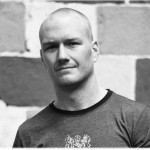
In the biopic Shooting Star(s): The Rise of Hip-Hop Photographer Johnny Nunez which premiered at the 2009 Urbanworld Film Festival, producers Axel Ebermann and Daniel Frei document many examples of the tenacity that fashioned Nunez’ hard-clawed ascension to HNIC of the hip-hop paparazzi.
“I’m [insert high-profile celebrity here]’s personal photographer,” he would often say, attempting to gain entry or secure a prime stake-out position.
He wasn’t. But it often worked.
When hired to photograph a relatively dull Hamptons event, Nunez sneaked out, visited a nearby mansion where Ja Rule and Swizz Beatz were partying, and took some shots there, before convincing the hip-hop stars to return to the first party with him. Nunez told them it was “his” party.
It wasn’t. But they came. And he got the shots.
While jockeying for position among front row audience members to get prime shots of performers like Kanye West, an irritated female party-goer was repeatedly bumped in the head by Nunez and his camera. She complained loudly. His response was cold. “I’m his photographer.” She said she didn’t care. Neither did he.
He simply continued shooting.
It is this equation, tenacity plus ingenuity multiplied by a hustler’s mentality that lifted Nunez to the proverbial next level. His demeanor is a honest mix of swagger and charm, and when he’s not fighting the good picture-taking fight, he can be riotously humorous, slyly clever, friendly and charming. In a world where photographers are notoriously labeled as a celebrity’s necessary evil, Nunez has been able to forge as much of a friendship with his subjects as a paparazzo can. It has paid off richly.
Johnny Nunez sells stories
The competition in the photojournalism game, Nunez explains, is ruthless. Despite hoping for, and in some instances, plotting his downfall, rivals probably can’t help but to admire Nunez while they loathe him. His ability to instantly command a photo opportunity merely with his presence forces mere shutterbug mortals to reluctantly sulk off to the wayside. His first-name basis dialog with stars can be intimidating enough to up-and-comers who are attempting to unseat his position, and Nunez himself strives to make it even harder.
In the Hamptons, after convincing Ja and Swizz back to “his” party, Nunez confidently and methodically directed his subjects as he often does and took the shots he needed. After the last flash, Nunez suddenly turned to other photographers and picture-seekers, literally waving them off. “They’re tired. Let them rest!” he proclaimed obnoxiously, as if he himself was in charge of their publicity.
As if to bark, “You [other] photographers are an annoyance, begone!”
Or, keeping it more real, as if to snarl, “Look. I got them here. I got the pictures. You lose. Back the fuck up!”
Amazingly, the others listened, awkwardly drifting away as the stars slipped back into the night. Nunez almost immediately sneaked off once again, back to a private area to begin processing and uploading his images to the photo wire services that license them to newspapers and magazines.

Only once his product is safely secured and circulating for purchase does Nunez spend a little time enjoying himself. His motto and mission is clear: while others party, he works. Period.
It is that principle that helped usher Nunez from the streets of Greenpoint around the world on several occasions, most notably, a recent excursion that culminated in the United Arab Emirates. Hand-picked by hip-hop titan Russell Simmons, Nunez was flown to several international locations to photograph Simmons, including a desert location in Dubai, camels included.
It wasn’t the first time Nunez was selected to shoot overseas for a mogul, (Damon Dash was one of Johnny Nunez’ early clients who shuttled him around the world as a personal concierge photographer). But it is impossible to downplay the significance of this level of reputation, trust and skill which Nunez enjoys.
What is also worth noting is that Nunez has self-amassed this one-man empire, without the help of managers or agents or publicists. His personal touch and everyman charm has endeared him to hip-hop icons and celebrity royalty alike. As Rev. Al Sharpton explains, “I grade whether events are A-list or not by whether he is behind the camera.”
Sharpton is right. If it is an A-list event, Nunez will most likely be in the house. Maybe even two or three “houses” in one night. He is work-ethic personified.
Johnny Nunez shares stories
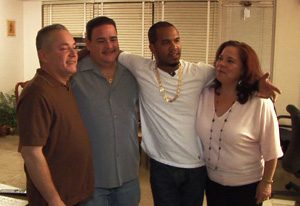
There is an underlying, and endearing theme to this documentary, once the camera is focused on the camera wielder himself: Humility. Johnny Nunez the photographer is an armor-covered Rottweiler in a dog-eat-dog world. Johnny Nunez the person seems quite a bit tamer.
Witnessing the premiere of the film, having never seen, met, nor heard much about Nunez, one would have been impressed at the opening events. After New York hip-hop stalwarts and long time supporters Fat Joe and DJ Cassidy spoke, Nunez presented two charitable organizations with donations, one of which was an organization for the visually impaired. Nunez’ reasoning: when you make a living using your eyes, you help those who can’t.
The emotions seem sincere, and watching the segments of the movie that show Nunez bantering with his family, donating to church, using his otherworldly connections to help a friend, and insisting that the sneakers he is helping design for Run Athletics have inspirational messages inscribed along the sole in Braille, further strengthens the impression that Nunez has nowhere near forgotten from whence he came, nor how he got to where he is.
Johnny Nunez IS a story
If they had the same kind of eagle-eye for capturing the money shot that Nunez does, perhaps some of those attending the premiere noticed his gift in action, a possibly unconscious extension of how tenacious he must be when battling for the visual highlight of any given night among other photographers covering the events he is covering.
Before the premiere fully got under way, as people filed in and settled into the cushioned theater chairs, festival organizers scurried about, making sure that family and other invited and high-profile guests made it to their reserved seats. The murmuring buzz of dozens of simultaneous conversation wafted through the air, mingling with the steady crunch of popcorn and the occasional burst of laughter. Visitors glanced at cell phones, members of the media jotted notes, and friends bantered playfully.
And down in front, was Johnny Nunez. In between handshaking and waving to the friends, family, and business associates in attendance, his eyes darted around the venue. His vision danced from corner to corner, top to bottom, observing, absorbing, perhaps assuring him that everything was in place, that everything was how it should be.
In this moment, when all the cameras were focused on him for a change, when the event was his and the story was about him, Johnny Nunez was seemingly still scanning, seeking, approving. Still peering around, visualizing. Orchestrating, and perhaps savoring, the perfect shot.
It was a perfect prelude. After all, it’s the story of his life.
About Shooting Star(s):
“Shooting Star(s)” follows Johnny Nunez (36), who was abandoned as a baby and later adopted by a Puerto Rican family, as he overcomes the obstacles imposed by his humble upbringings in Brooklyn, New York to become today’s most prominent Hip Hop celebrity photographer.
The filmmakers Axel Ebermann and Daniel Frei document the incredible journey of this man, who is now on the verge of becoming a celebrity himself.
The film shows the glamorous life of Johnny Nunez as he mingles with prominent figures such as Russel Simmons, Al Sharpton, Kanye West, Kimora Lee and Fabulous. But the film also portrays the inspirational journey of a man who defies poverty and racism and uses his wit, tenacity and faith to pursue his American Dream.
“Shooting Star(s) was awarded “Best Documentary” at the San Francisco Black Film Festival in early 2009.
Preview Production is an international film and television production company with offices in Munich, Germany and New York. Preview develops films from the initial concept to the finished product.
The roster of our clients includes US channels such as ‘Showtime’ and ‘Discovery’ as well as a wide variety of European broadcasters.
Axel Ebermann has produced and directed numerous feature documentaries for European TV networks.
Daniel Frei has produced and directed numerous films for broadcast. His latest fiction short stars HBO’s Adrian Grenier (Entourage) and Miryam Coppersmith (The Sopranos).
For more information: www.shootingstarsthefilm.com
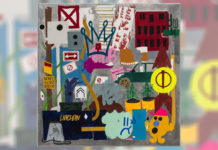
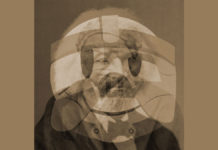
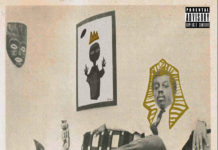
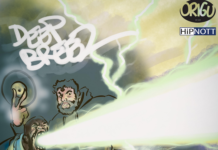
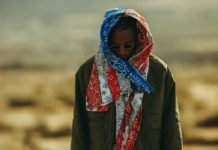
![The Underachievers – Crescendo [VIDEO]](https://www.birthplacemag.com/wp-content/uploads/2017/08/hqdefault-2-218x150.jpg)


![Fat Joe & Remy Ma ft. The-Dream – Heartbreak [VIDEO] Fat Joe Remy Ma The Dream - Heartbreak Video](https://www.birthplacemag.com/wp-content/uploads/2017/05/fat-joe-remy-ma-218x150.jpg)
![JSWISS featuring Chandanie – LML [VIDEO] JSWISS featuring Chandanie - LML [VIDEO]](https://www.birthplacemag.com/wp-content/uploads/2017/05/JSWISS-218x150.jpg)

![Akinyemi Ends Summer With “Summers” EP Release Show [9-17-17] Akinyemi 'Summers' EP release show at Brooklyn Bazaar](https://www.birthplacemag.com/wp-content/uploads/2017/09/summers-featured-218x150.jpg)
![4th Annual NYC VS EVERYBODY Yacht Party [9/16/17] #VSYacht 4th annual NYC VS Everybody Yacht Party#VSYacht](https://www.birthplacemag.com/wp-content/uploads/2017/09/vsyacht-218x150.jpg)
